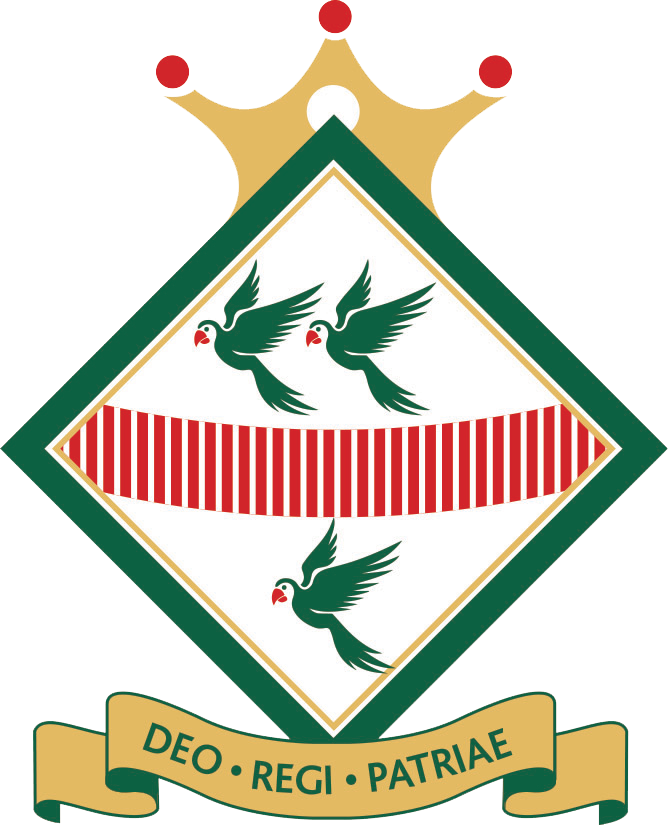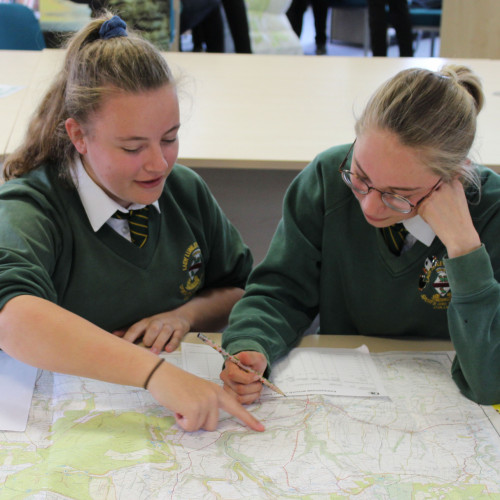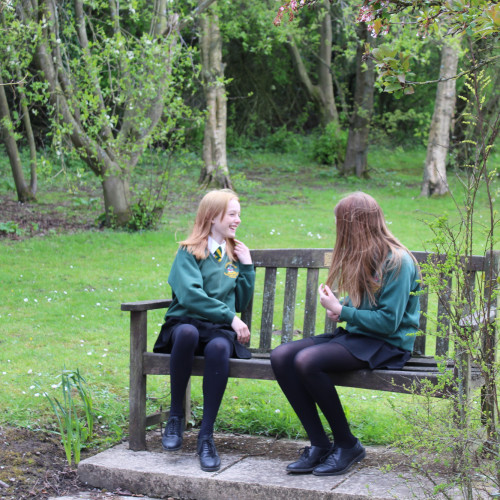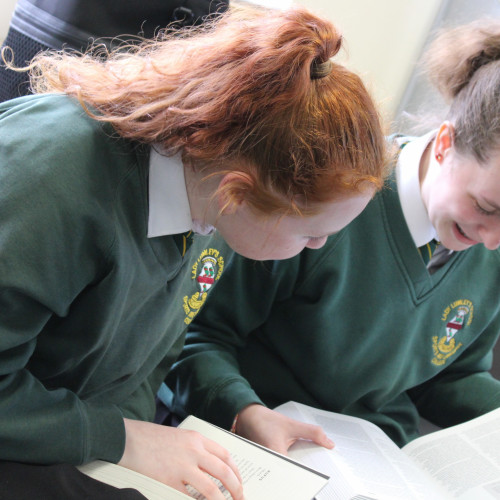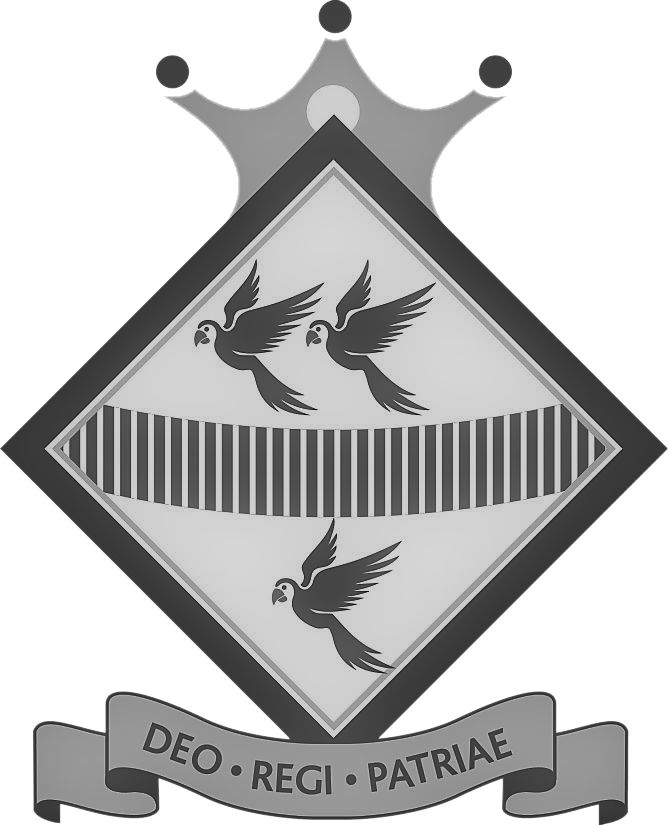Geography
Key Stage 3
The Key Stage 3 geography curriculum has been designed in house to bring the most contemporary and engaging geography themes to our students. Each lesson starts with a key question that will be explored, investigated and answered. Students will develop their locational knowledge, analytical skills and decision making as they look at a range of environments and cultures. Students will be encouraged to build geographical and numeracy skills as we study both human and physical geography within each topic.
Year 7
The Key Stage 3 Geography curriculum introduces students to a broad understanding of the world, its environments, and the complex interactions between people and places. Starting with the fundamental question, "What is Geography?", students explore the study geography and the key interactions between people and their environments. Geographical skills are also taught in this unit, and built upon throughout all Key Stages. Topics like Extreme Environments delve into the harshest climates on Earth, examining how life adapts in deserts and polar regions. In "Can Water be Managed?", students investigate global water resources, the challenges of water scarcity, and sustainable solutions, enhanced by fieldwork that brings these concepts to life through hands-on experiences. The curriculum also explores regional studies, such as "Is Africa Awakening?", where learners examine Africa's social, economic, and political changes, and "Is the Amazon Awesome?", highlighting the ecological significance and threats facing the Amazon rainforest. Through critical discussions like "Can Our Perceptions of the World be Challenged?", students are encouraged to reflect on how their views of global issues are shaped and may change as they deepen their understanding of geography. These topics together form a comprehensive introduction to the diverse and dynamic nature of our world.
Year 8
The Year 8 geography curriculum introduces students to a variety of critical global issues, such as "Can hurricanes cause havoc?" This topic explores the causes, effects, and long-term impacts of hurricanes on human and natural environments. Students go on to examine climate change by asking, "Is the climate in crisis?" Here, they will explore evidence of climate change, its global effects, and the steps being taken to mitigate its impact. Furthermore, the curriculum addresses global development with the question, "Are there challenges to development?" This unit delves into the socio-economic and environmental barriers that hinder development in different parts of the world. The fourth major theme, "Will the world's population reach 10 billion?" encourages students to look at population trends, challenges of overpopulation, and the implications for resources and sustainability. Finally, students investigate the world of commerce in the term focusing on "Is business booming?" This unit covers global business trends, global economic systems, and how industries adapt to global demands.
Year 9
The Year 9 geography curriculum dives deeper into key global and environmental topics, building on Year 7 and 8 content. In "Why is Our Earth Restless?", students examine the dynamic forces beneath Earth's surface, such as tectonic activity, earthquakes, and volcanoes, to understand how these phenomena shape the world. "Is Asia Advancing?" explores Asia's economic and social growth, highlighting the region's development and its role in global affairs. "What Makes Our Rivers Rage?" delves into the causes of flooding and river dynamics, including practical river fieldwork to investigate how water systems operate. "Do we have Enough?" challenges students to think about the sustainability of natural resources like water, food, and energy, asking how we can manage these resources responsibly. Finally, "How Can We Close the Development Gap?" explores global inequality, investigating ways to reduce disparities in wealth and development between different regions and countries. This curriculum not only builds geographical knowledge but fosters critical thinking about pressing global issues.
Enrichment
Fieldwork is viewed by the department as an essential part of the geography course. Therefore, fieldwork is integrated into the curriculum for every year group. KS3 fieldwork uses the local environment whilst KS4 have the opportunity to travel further within Yorkshire.
The department is also heavily involved in the Duke of Edinburgh award scheme helping us to share our passion for the outdoors environment. We also regularly enter competitions run by the Royal Geographical Association.
Useful links:
- https://www.bbc.co.uk/bitesize/subjects/zrw76sg
- https://www.bbc.co.uk/bitesize/examspecs/zsytxsg
- https://www.ordnancesurvey.co.uk/mapzone/
- Home - Geographical Association
GCSE Geography
AQA GCSE Geography covers a wide range of key topics that focus on both physical and human geography. In physical geography, students explore natural hazards, including earthquakes, volcanoes, and climate change, as well as ecosystems such as tropical rainforests and hot deserts. The study of rivers and coasts helps students understand key processes shaping the environment in the UK. In human geography, topics include urban issues and challenges, the changing economic world, and resource management, with a focus on energy. Students also gain important geographical skills, such as map reading, data interpretation, and fieldwork techniques. Throughout, there is an emphasis on sustainability and the impact of human activity on the environment.
At GCSE students study 3 components:
There are three exam papers in total:
Paper 1: Living with the physical environment
- Section A: The challenge of natural hazards
- Section B: The living world
- Section C: Physical landscapes in the UK
Paper 2: Challenges in the human environment
- Section A: Urban issues and challenges
- Section B: The changing economic world
- Section C: The challenge of resource management
Paper 3: Geographical applications
- Section A: Issue evaluation
- Section B: Fieldwork
GCSE Geography Specification:
AQA | Geography | GCSE | GCSE Geography
Enrichment
Fieldwork to Hornsea offers geography students practical, hands-on experience in coastal studies, allowing them to observe coastal erosion and management strategies in real time. We also investigate housing quality in this location. Participating in RGS (Royal Geographical Society) competitions encourages students to develop research skills, critical thinking, and creativity as they tackle real-world geographical challenges.
Study Plus sessions support students in enhancing their academic performance by providing additional, focused revision and study time, helping them prepare for exams or improve in specific subjects. These enrichment activities foster a well-rounded, engaging educational experience that develops both academic and personal skills.
Useful links:
- https://www.bbc.co.uk/bitesize/subjects/zrw76sg
- GCSE Geography - AQA - BBC Bitesize
- https://www.ordnancesurvey.co.uk/mapzone/
- https://www.geography.org.uk/Visual-Geography-Useful-Websites
A Level Geography
Geography A level is designed to challenge student perceptions and to encourage them to develop investigative and critical thinking skills. The units taught in Year 12 include changing places, coasts and hazards.
- Hazards - This topic focuses on the lithosphere and the atmosphere, which intermittently but regularly present natural hazards to human populations, often in dramatic and sometimes catastrophic fashion.
- Coasts -This section of our specification focuses on coastal zones, which are dynamic environments in which landscapes develop by the interaction of winds, waves, currents and terrestrial and marine sediments. The operation and outcomes of fundamental geomorphological processes and their association with distinctive landscapes.
- Changing places - Designed to explore the relationships between key aspects of physical geography and population numbers, population health and well-being, levels of economic development and the role and impact of the natural environment.
In the second year of the course, students will study population and environment, globalisation and water and carbon units.
- Water and carbon - Focuses on the major stores of water and carbon at or near the Earth’s surface and the dynamic cyclical relationships associated with them. These are major elements in the natural environment and understanding them is fundamental to many aspects of physical geography
- Globalisation and global system - Looks at the economic, political and social changes associated with technological and other driving forces which have been a key feature of global economy and society in recent decades.
- Population and the environment - Designed to explore the relationships between key aspects of physical geography and population numbers, population health and well-being, levels of economic development and the role and impact of the natural environment
A Level Geography Specification:
https://www.aqa.org.uk/subjects/geography/as-and-a-level/geography-7037
Enrichment
Fieldwork is viewed by the department as an essential part of the geography course. Therefore, fieldwork is integrated into the curriculum for every year group. Year 12 visit coastal environments and Year 13 enjoy a residential field trip to the Lake District.
We also regularly enter competitions run by the Royal Geographical Association.
Useful links:
